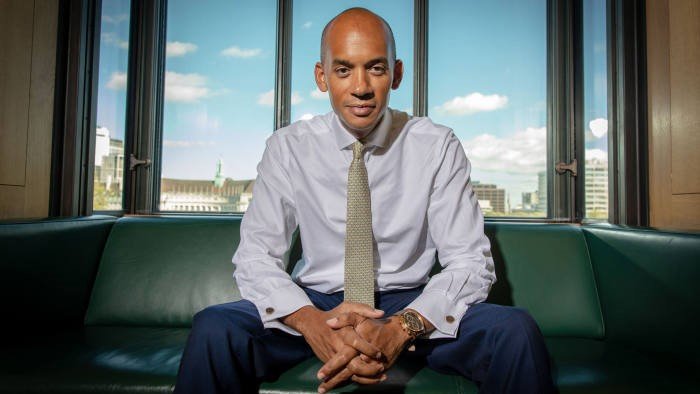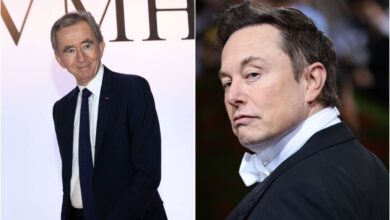Meet Chuka Umunna, the Nigerian Known as “Britain’s Obama”

BACKGROUND
Chuka Umunna was born in 1978 to a young interracial couple living in Lambeth, London. His father was a Nigerian who owned an import-export business, while his mother was an English-Irish lawyer. Umunna had a relatively privileged upbringing. He did not necessarily face the same racial prejudice other African children faced in the country: he was mixed-race, born in England and had a natural British accent. Most importantly, his family was quite wealthy.
He began schooling at Hitherfield Primary School in Streatham and then moved to the Christ Church Primary School in Brixton Hill, before his parents decided local schooling was not the right fit for him and instead moved him to the expensive private school, St Dunstan’s College in Catford.
When he was 13, he lost his father in a suspicious car crash in Nigeria, a traumatic experience that would later lead him to shield his family from the public eye even during the height of his political career. He bagged an upper second class LLB in English and French Law from the University of Manchester. He went on to study for an MA at Nottingham Trent. After school, he worked as a corporate employment lawyer from 2002 till 2010, when he was elected to the British Parliament.
POLITICAL CAREER
Umunna’s career had quite the electric start. Prior to his 2010 election, he was known as a firebrand in the British political clime, writing op-eds in support of the Labour Party in publications such as Financial Times, Tribune, The Voice, The Guardian and the New Statesman, in addition to appearances on television and radio shows.
He was noted in the media for his charisma and suave demeanour. Some outlets described him as the well-dressed man in British politics. These qualities, coupled with his status an overachieving black man, earned him the nickname “Britain’s Obama”.
During the 2010 UK general elections, Umunna won the parliamentary seat for Streatham while representing the Labour Party, grabbing 43% of the total votes cast. He won again in 2015 and 2017, the latter being his peak year during which he won 69% of the votes. A month after his May 2010 victory, he was elected in the parliament to join the Treasury Selection Committee. In October of that year, he was hand-picked by party leader Ed Miliband to be his Parliamentary Private Secretary. Around this time, he was promoted to the position of Shadow Secretary in the House of Commons.
A media favourite, he was already being touted to be the Labour Party’s next leader less than a year into his tenure in parliament, with publications like the London Evening Standard profiling him with his status as an eligible party head. He eventually threw his hat into the ring in 2015, vying for the position of party leader against Jeremy Corbyn. Three days after announcing his intentions to run for leadership, he withdrew his candidacy, citing the maddening level of media scrutiny affecting his personal life as the major factor.
Following Corbyn’s victory, Umunna resigned from his position as Shadow Secretary due to certain differences with the new leadership. Slowly, Umunna’s stances on issues began to appear to differ from the rest of the Labour Party. He became openly derisive of Corbyn, calling him “juvenile”, “Marxist,” and a stooge “lauding authoritarian regimes”. The newspapers speculated that he was no longer happy being at the party. In 2018, he became the chairman of a centrist think tank called Progressive Centre UK
In 2019, he left the Labour Party to form the Change UK with six other members of parliament. After the new party performed poorly at the May 2019 EU elections, Umunna switched yet again, this time to the Liberal Democrats, a party he had spent nearly a decade castigating. He represented the new party at the 2019 general elections. Unfortunately, he was defeated by almost 4,000 votes, losing his seat in parliament.
ISSUES
- Brexit: Umunna maintained a strong position on the Brexit controversy, and that was one of the reasons he left the Corbyn-led Labour Party. During the 2016 Brexit Referendum, Umunna voted for Britain to “Remain” in the European Union. So staunch was his stance that he mobilised 79.5% of his constituency to vote for the “Remain” agenda, the highest proportion in the country. After the referendum, his party lost, and he eventually voted in the House for the United Kingdom to leave the EU, saying “as democrats, we must abide by the national result”. There was a volte-face to his new soft stance in 2018 when he accused the pro-Brexit opposition of lying to the public back in 2016 during the campaign leading up to the referendum. He called for a second referendum which would represent the true feelings of the British people.
- Healthcare: Umunna has always advocated for radical reforms in the British healthcare system. With the National Health Service [NHS] notoriously under-staffed and under-funded, Umunna has been at the forefront of putting pressure on the government to seek alternative ways to strengthen the NHS in the face of growing health problems in the United Kingdom. In 2018, he proposed a solution that would require the country to pay up to £30bn more on the NHS than it currently did by 2022-2023.
- Environment: He believes the United Kingdom has a moral and financial incentive to become the leading voice in the battle against climate change. He supports a circular economic model that involves the restoration and regeneration of materials. He believes it could “boost Europe’s resource productivity by 3 percent by 2030, generating cost savings of €600bn a year and €1.8 trillion more in other economic benefits”.
CONTROVERSY
“Chuka Umunna is now in his third party within four months,” noted a 2019 article by The Guardian. This was about Umunna’s flip-flopping between political parties in 2019, including joining a party he had once deemed an enemy to be destroyed. This caused the media to cast him in unfavourable light, with publications calling him “vain”, “shallow”, “cowardly” and “hypocritical”.
When he withdrew his candidacy for the position of Labour Party leader three days after the announcement, the British media hit him with speculations that he had skeletons he wanted to be kept in his cupboard. Though he denied all rumours, the media was convinced that he wanted to deflect attention from uncorroborated reports of his supposed history of drug use and hidden sexuality.
Umunna’s feud with Corbyn has been heavily documented in the media. Beyond their unfriendly public statements about each other, it is obvious there is no love lost between them. Once in a meeting with the then Prime Minister Theresa May, Corbyn walked out the moment he spotted Umunna in the room as well. The rivalry got so intense that supporters of Jeremy Corbyn directed vitriol at Umunna to the point that, as he claims, he received multiple death threats.







